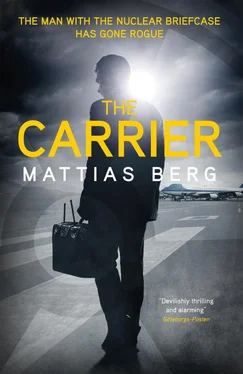Mattias Berg - The Carrier
Здесь есть возможность читать онлайн «Mattias Berg - The Carrier» весь текст электронной книги совершенно бесплатно (целиком полную версию без сокращений). В некоторых случаях можно слушать аудио, скачать через торрент в формате fb2 и присутствует краткое содержание. Город: London, Год выпуска: 2019, ISBN: 2019, Издательство: MacLehose Press, Жанр: Триллер, на английском языке. Описание произведения, (предисловие) а так же отзывы посетителей доступны на портале библиотеки ЛибКат.
- Название:The Carrier
- Автор:
- Издательство:MacLehose Press
- Жанр:
- Год:2019
- Город:London
- ISBN:978-0-85705-788-4
- Рейтинг книги:4 / 5. Голосов: 1
-
Избранное:Добавить в избранное
- Отзывы:
-
Ваша оценка:
- 80
- 1
- 2
- 3
- 4
- 5
The Carrier: краткое содержание, описание и аннотация
Предлагаем к чтению аннотацию, описание, краткое содержание или предисловие (зависит от того, что написал сам автор книги «The Carrier»). Если вы не нашли необходимую информацию о книге — напишите в комментариях, мы постараемся отыскать её.
The Carrier — читать онлайн бесплатно полную книгу (весь текст) целиком
Ниже представлен текст книги, разбитый по страницам. Система сохранения места последней прочитанной страницы, позволяет с удобством читать онлайн бесплатно книгу «The Carrier», без необходимости каждый раз заново искать на чём Вы остановились. Поставьте закладку, и сможете в любой момент перейти на страницу, на которой закончили чтение.
Интервал:
Закладка:
After a rapid march, in part a steady run, I completed the 150 miles over the ice to my goal. The temperature rose at first but then it fell, although never becoming unbearable. The moon shone from a clear sky and revealed traces of the facility, both upper and lower parts. The multi-layered secret—like Ingrid’s and Sixten’s work on what they called First, Second and Third Tier development, and from about the same era. The beginning of the 1960s. The time of promise, of lies and illusions, of Doomsday dreams.
A slight indentation in the glacier was the only sign. Small but decisive evidence of what could not remain hidden through the decades, although we had been convinced it would. The start of the way in, below. I crept and wormed my way through the metal ventilations shafts, instead of the usual entrance along much wider but already collapsed upper ice tunnels.
And now I sit down here, at my destination. Around me hangs the inner darkness of the continental ice. I let the headlamp I found in a storage room on the cargo vessel play over the walls, and gape, amazed at what mankind can create: cannot stop the tears. I have never seen anything so overwhelming, or so insane. This gigantic hall under the glacier, at least fifteen feet high and three hundred by three hundred in area, excavated and sculpted in the smallest detail, with fixed chairs, benches and work surfaces entirely made out of ice.
It is a little like the Jukkasjärvi Ice Hotel, but in deadly earnest, literally so. Edelweiss told us that ice was the chosen material even here in the command center, making everything as flexible as possible. So that this whole interior could be torn down and built back up again, in a few days at most.
The chair I am sitting on is broad and theatrical, like a frozen throne. Covered with Arctic fox fur, still in perfect condition, from the mammal with the best protection against extreme cold. One of the few which has really adapted to this environment. So we humans have just taken its equipment, put the chalk-white protective material on a number of the bare ice surfaces down here.
But the most remarkable thing stands in front of me: the enormous control panel. The only thing in here not made of ice. The very heart of this command center for the thousands of launch sites which were going to be built under the ice, where hundreds of climate-modified Minuteman missiles, called “Iceman”, were to be aimed at Russia.
This whole construction was intended to be bigger even than the Inner Circle in Ursvik, under a surface area three times the size of Denmark, with a complex tunnel network for the missiles, 2,500 miles long.
So the code name “Project Iceworm” was perfectly apt. Edelweiss had called it an historical high point, never since exceeded, in double-dealing and underground engineering. Above the ceiling of the command center was the official part of the project, called “Camp Century”. What we presented to the Danish authorities as an experimental station for cutting-edge research into how man should not only be able to survive but also thrive in an arctic environment, fully equipped with stores, library and chapel.
Now the control console is as defunct and abandoned as the rest of this masterpiece, both the official upper level and the lower top secret level. The system as a whole was powered by the world’s first mobile nuclear reactor, which was removed before the facility was deserted in the mid ’60s, after only a few years of operation, when the geologists established that Greenland’s pack ice was not at all as stable as had at first been thought. That the elasticity in this natural material would cause the installation to break up, the missile tunnels and command center down here as well as the lodgings and low-temperature laboratories above.
So it was all left behind, in the greatest haste, like the Inner Circle. Was allowed to remain standing as it was—because the falling snow would cause the ice sheet to grow even thicker, burying the secrets under a blanket of eternity.
But then came the greenhouse effect. According to some calculations, it would not take more than a few decades before traces of these highly classified installations would literally surface. Radiation and nuclear fallout had already started to become an issue between our Administration and Denmark’s, each of us N.A.T.O. partners, and soon the new revelations would make the relationship poisonous.
So I find myself sitting here, alternating between writing and just gazing. Everything feels as if in a movie: with the help of my headlamp I can change the scenes, from close-up on the pale bluish sheen on the desk in front of me to wide angle on the similar nuance of the walls. Light up the historic darkness of the Command Center, this palace of ice.
An exploration of my immediate surroundings has revealed much that is still well preserved down here, as if it were a museum of man’s worst fantasies. Even some rudimentary food supplies are largely intact, freeze-dried, but there are also cans and some powdered soups. Some of the gas canisters are still functional. I could keep myself going down here for months more, far longer than I will need.
And when I also discovered the parchment, everything became clear to me. What I would have to do with all that is in my notebook, now that Edelweiss can no longer bury it.
Because the world of paper has been superseded by the digital age, and still nobody knows how long information recorded with either medium will last. All those war directives, indispensable instructions for everything from nuclear weapons to cipher systems, the bureaucracy of conflict. Turning to dust or vanishing into thin air. But parchment on the other hand has a track record. The Dead Sea Scrolls, for example, are still legible—two thousand years after they were written—having been stored in a cave.
Edelweiss had talked about it during one of his historical presentations on the subject of Camp Century and Project Iceworm at the beginning of the ’60s. Said that among numerous scientific experiments on the effects of extreme cold performed in this location, there had been tests carried out in collaboration with the Library of Congress which showed that very low temperatures were effective in preserving parchment: it remained in the same mysteriously natural state as early man and mammoths found buried in ice. This was interesting to us too, he said, now that the short, digital era appeared to be nearing its end. When the R.S.A. encryption had more or less been cracked—and no form of digital storage could promise data integrity for more than a century at most.
So I take one of the preserved rolls out of the half-century-old metal cupboards and unpack it. One can still make out the veins of the dead animal, the sheep from which the parchment came, a slight blue blemish within the writing surface. With a certain reverence I pick up one of the special pens which I find beside the packages.
Then I start to transcribe my testimony from the notebook to the parchment. Despite the damage it has suffered during the months of my flight, the damp and cold, blood and impact, the journey here, it is mostly legible. I keep adding things as well. Descriptions of nightmares, my inner musings, parts of my dissertation as I still recall them.
In short, the whole of this account as you have now found it and are reading it. You, posterity, whoever you may be. Somewhere in my future and your present. After a certain time—a week, two, more, it is no longer possible to measure time deep under the inland ice—it is finally ready. Now comes the conclusion.
My headlamp does not reach as far as the door at the opposite end of the hall. But the route is familiar to me. I have memorized the sketches ever since Edelweiss’ historical lectures, regarded this as my ultimate goal long before Ingrid began sending her encrypted messages to the cell phone at the playground. When I realized that I would not be lowering the briefcase and myself under the so-called “eternal” ice, as I had dreamed and feared, but would instead meet Alpha somewhere 253.3 feet under the surface of Stockholm. And then proceed onward in her company, without having any idea where we were going.
Читать дальшеИнтервал:
Закладка:
Похожие книги на «The Carrier»
Представляем Вашему вниманию похожие книги на «The Carrier» списком для выбора. Мы отобрали схожую по названию и смыслу литературу в надежде предоставить читателям больше вариантов отыскать новые, интересные, ещё непрочитанные произведения.
Обсуждение, отзывы о книге «The Carrier» и просто собственные мнения читателей. Оставьте ваши комментарии, напишите, что Вы думаете о произведении, его смысле или главных героях. Укажите что конкретно понравилось, а что нет, и почему Вы так считаете.












